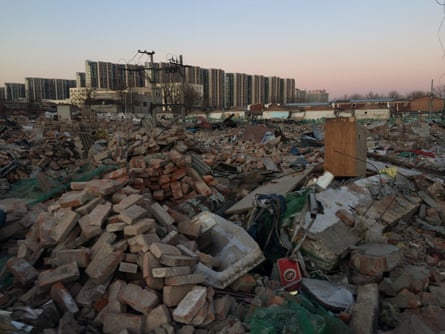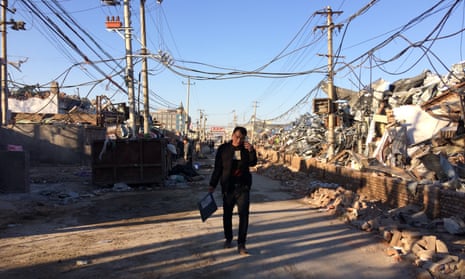Inside the shell of one of dozens of derelict buildings in this condemned migrant community, a cinnabar-coloured calendar was nailed to the wall, adorned with the face of Chinese leader Xi Jinping and his inescapable political slogan: “CHINA DREAM”.
Outside, as night fell and roadside puddles hardened into black ice, rural migrants who had come to China’s capital chasing pavements of gold set about dismantling their own.
In the village of Sanyingmen, a family of restaurateurs from Anhui, one of east China’s poorest regions, load the fruits of their labour onto the back of a van: a mattress, a wardrobe, a grease-stained cooking pot. A man from Jiangxi province scavenges internet cables from a heap of demolished shacks, having been given 24-hours to vacate his home.
Such scenes are playing out across Beijing after authorities launched a 40-day housing crackdown following a deadly tenement fire on the city’s southern outskirts which killed 19 people, eight of them children. Activists believe authorities are using that blaze as a pretext to accelerate ongoing efforts to drive tens of thousands of “low-end” migrant workers out of the city.
Beside a sea of bricks that had been the heart of a once-bustling settlement, a man takes aim at his president’s pledge to rule as a champion of the poor.
“I think what is happening is that ... Xi Jinping has water in his head,” he fumes, a teary eye giving way to anger as he recounts how officials gave Sanyingmen’s residents until 7am the next day to leave. “I’ve no idea what the China dream really means,” the 40-year-old says. “My nights are sleepless. How can I possibly dream?”

Some activists suspect even more sinister motives lie behind the mass eviction and demolition campaign, such as grabbing valuable land in gentrifying areas of the city. In recent years property prices have rocketed in Daxing, a region of southern Beijing that has been the focus of much of the wrecking. The city’s new international airport – an 80bn yuan (£9bn) mega-structure designed by Zaha Hadid Architects – is set to open there in 2019.
“The Chinese [authorities] have a way of being brutal that is often related to a very substantive project,” says Saskia Sassen, a Columbia University sociologist whose latest book, Expulsions, examines the driving forces behind such evictions. “Yes, [driving out the poor] is definitely always in there – but is there also something else?”
City officials deny they are seeking to banish Beijing’s estimated 8 million migrant workers and claim their focus is saving lives by clamping down on illegal, unsafe and overcrowded buildings. Last week Beijing’s Communist party chief announced that ensuring safety and stability was now his “biggest political task”.
But the scenes of migrants being driven from their drab rented homes – captured in heart-wrenching smartphone videos – have sparked public outrage just weeks after Xi began his second term promising citizens a “new era” of power and prosperity.
“It is a humanitarian crisis,” says Zhang Lifan, an outspoken political commentator involved in a petition condemning the government’s treatment of people he calls refugees.
Having helped make Beijing a bustling metropolis, the factory workers, maids, builders and couriers now being uprooted deserve more than “arrogance, discrimination and humiliation”, the appeal states.
Beijing’s housing crackdown – which began months before the recent fire but appears to have intensified dramatically since – has reduced swaths of the city’s dilapidated periphery to a clutter of rebar and concrete.
From busy neighbourhoods to deserted wreckage
Xinjian village, a once-teeming neighbourhood of garment factories and migrant dwellings where the deadly fire broke out, is now half-ghost town, half-disaster zone, its buildings either emptied of life by squads of black-clad police or levelled completely by diggers.
“I’ve lost everything,” complains Cao Bo, a 34-year-old hairdresser from Anhui, as he clears out his recently opened salon in the community.
Further on, a cluster of Chinese artists regard the epicentre of the devastation with a mixture of disgust and enthralment.
Anita Guo, a 30-year-old visual artist, says the group came seeking inspiration for a politically charged art project. “It’s a man-made earthquake ... Our government is just thinking in a really weird, weird way,” she says.
Another member of the collective, Xi Lin, says some suspected the fire was being used as an excuse to purge the poor: “It’s fucked up ... inhuman.”

Xi describes the evictions as part of a broader bid to control Beijing’s 20 million-plus population and “beautify” its traffic-clogged streets. “I like the vision they have. They want to turn Beijing into a ... less crowded, more green place,” she says. “But I think the method is too harsh. Way too harsh.”
Moments later, a local man races past on an electric bicycle, shouting: “Take more photographs! The Chinese Communist party is inhuman!”
Crowd-sourced online maps show how the mass evictions and demolitions – which some claim have affected as many as 100,000 people – have upended lives right across this Asian mega-city.
In Banjieta village, on Beijing’s north-western fringe, scavengers comb through the ruins of another recently felled housing estate. “They just want us to go home,” says Wang Qin, a 46-year-old recycler from Henan province. “These officials and Xi Jinping: they don’t want the poor living here.”
Nearby, Zheng Yuzhi, a migrant from Shandong, dug a grave-like shelter into another recently cleared area, having lost her home to the wrecking ball and then her savings, when she was robbed.

“I’ve got no money ... no way to go home,” laments Zheng, 59, who spent a decade sweeping Beijing’s streets but now sleeps under a tatty placard in the dirt.
In Xibanbidian, another north-western village, children file out of a recently condemned kindergarten past a field of wreckage that had once been low-cost migrant housing.
“The government has abandoned us,” says Peng Jia, 33, a mother of two from Hunan who recalls seeing thousands of labourers streaming out of the area last weekend after they were ordered to leave.
“The supermarkets have closed. The school is shutting down. Everything is closing down,” Peng adds. “It is so unfair. But nobody comes here to listen to us – nobody hears our voices.”
‘If they want you to go, you have to go’
Back in Sanyingmen, residents prepare for their last night in the urban village. Red spray paint had been used to daub the Chinese character chai (拆) – demolish – on to those buildings which had not already been torn down.
A stroll through one already-levelled section underlined the suddenness with which the community’s population had been dislodged. Beds and belongings lie buried under layers of timber and rubble; family photographs and posters still cling to walls; already precarious lives interrupted by the blitzkrieg of wrecking.
Li Yanhong, a 30-year-old evictee, says he had little choice but to return to his home in Jiangxi. “By tomorrow there will be no one left,” he sighs. “I’m angry, but what can I do? If they want you to go, you have to go.”
Others voice indignation and despair as the curtains come down on their struggle to build a Chinese dream. “I’ve got no home to go back to … tomorrow I won’t have anywhere to sleep,” says Li’s neighbour, a migrant from Anhui who asked not to be named. “I feel panic, in my heart and in my mind.”
Two months ago, Xi ordered officials to make good on the Communist party’s “solemn pledge” to care for China’s masses: “We should see that our people will always have a strong sense of fulfilment, happiness and security.”
This week, Sanyingmen’s residents were stripped of all three.
Additional reporting by Wang Zhen
